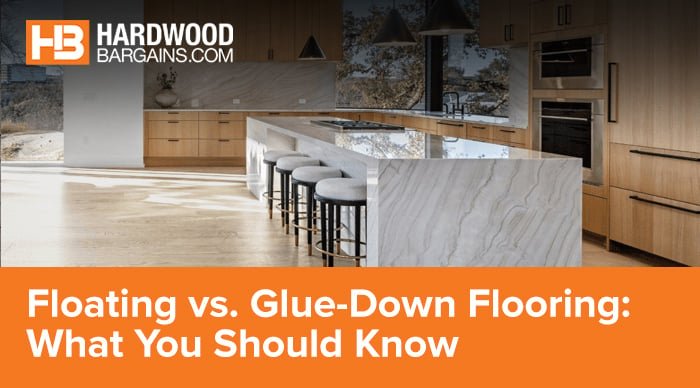When it comes to installing engineered hardwood flooring, one of the biggest decisions you’ll face is whether to install it floating or glue-down. Both methods have their advantages—and understanding which is right for your space can make all the difference in performance, longevity, and ease of installation.
At Hardwood Bargains, we’re here to help you make the right call for your project. Whether you’re doing it yourself or working with a professional, this guide provides a comprehensive breakdown of everything you need to know.
What Is a Floating Floor?
A floating floor is exactly what it sounds like—it “floats” over your subfloor without being directly attached to it. Instead, the individual planks lock together using a tongue-and-groove or click-lock system. The floor sits on top of an underlayment, which helps with sound absorption and moisture protection.
Benefits of Floating Installation:
DIY-Friendly: No adhesives, no nails—just click or lock the boards together.
Faster Installation: Without glue or drying time, floating floors go down quickly.
Easier Repairs: Need to replace a damaged plank? Floating floors are easier to disassemble and reassemble.
Subfloor Flexibility: Works over concrete, tile, plywood, or even existing flooring.
Things to Consider:
Sound: Floating floors can sometimes produce a hollow sound when walked on. A quality underlayment can reduce this.
Stability: While still strong and durable, floating floors may flex slightly underfoot, especially over uneven subfloors.
What Is Glue-Down Flooring?
With glue-down installation, each plank is adhered directly to the subfloor using a strong adhesive. This method is commonly used for concrete subfloors or in areas where a permanent, stable floor is preferred.
Benefits of Glue-Down Installation:
Sturdier Feel Underfoot: No bounce or flex—this feels like a traditional hardwood floor.
Excellent Sound Dampening: Minimal hollow sound due to direct contact with subfloor.
Long-Term Stability: Once installed, glued-down floors aren’t going anywhere. They handle humidity and heavy traffic well.
Things to Consider:
Professional Help Recommended: Glue-down is more complex and requires precision, especially with adhesives.
More Prep Work: Your subfloor needs to be clean, dry, and perfectly level.
Harder to Remove: Changing or repairing glued flooring can be a labor-intensive process.
Which Installation Method Is Best for You?
Here’s a simple breakdown to help you decide:
Factor
Installation Speed
DIY Capability
Subfloor Condition
Moisture Resistance
Sound Quality
Ease of Repair
Long-Term Durability
Floating Floor
Faster
High
Multi-surface ready
Good
Can be hollow
Easy to remove/replace
Great for most homes
Glue-Down Floor
Slower
Low to Moderate
Must be Smooth/Level
Excellent
Quiet and Solid
More Difficult To Fix
Ideal for High-Traffic/Humid Areas
Our Recommendation
At Hardwood Bargains, our engineered hardwood flooring is built with flexibility in mind. Most of our collections can be installed using either method. If you’re upgrading a second-story condo or want a quick install over tile, floating installation is a smart and cost-effective choice.
If you're creating your forever home, have a concrete subfloor, or simply want that traditional “solid wood” feeling underfoot, a glue-down installation could be the better fit.
Not sure which way to go? Our team of flooring specialists is happy to walk you through the options. Just send us a photo of your space or give us a call.
Bonus Tip: What About Moisture?
No matter which installation method you choose, moisture matters. For floating floors, we recommend using a moisture barrier underlayment—especially in areas like basements or kitchens. For glue-down floors, make sure the adhesive you use is moisture-resistant and approved for engineered wood.
And always remember: engineered hardwood is more moisture-stable than solid hardwood—but it’s not waterproof. A little prevention goes a long way!
Final Thoughts?
Choosing between floating and glue-down comes down to your space, your timeline, and how hands-on you want to be. The good news? With Hardwood Bargains, you’re starting with high-quality flooring either way.
Our engineered hardwood floors are made with a durable multi-layer core, a thick real wood wear layer, and a UV-cured scratch-resistant finish—designed to perform no matter how you install them.
Still have questions? Our flooring experts are standing by to help you decide what works best for your space.
✅ Samples available
✅ Expert guidance from start to finish
✅ Ships fast across the U.S.
Let’s get your project started.





